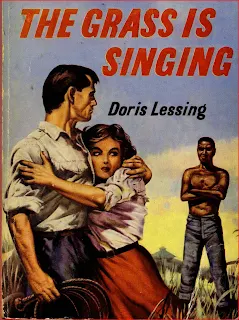Character of Mary in The Grass is Singing
We are introduced to Mary Turner in
the first chapter of the novel, The Grass is Singing. The author Doris Lessing
begins her story with a cutting from a newspaper article about the death of
Mary Turner. It says that Mary Turner, a white woman, was killed by her black
servant Moses for money. The news actually acts like an omen for other white
people living in that African country (Rhodesia) on looking at the article,
people behave as if the murder was very much expected.
We are then taken to a flashback in
which the author Doris Lessing describes the kind of woman Mary was and how she slowly
degenerated. Mary’s childhood was largely unhappy. She was brought up by
parents who ran a store in a farming community; her father was a drunk and her
mother bitter and twisted. Mary was delighted to leave home and get a job in
the city. With a wide circle of friends, she had no desire to marry, until she
reaches her thirties and her friends start to treat her as odd because she is
still single. When Dick Turner asks her to marry him, she agrees and goes to
live on his farm, where her life completely changes.
Mary is shocked to see the condition
of Dick and his farm. He lives in a tin-roofed shabby house without ceilings.
However she makes the house a bit comfortable by spending all her savings. She
is even unable to handle the ill-behaved native servants. She is anti-social, does
not like to mix with the neighbors, who, she thinks are inferior to her.
When Dick falls ill with malaria,
Mary takes charge of the situation. She loathes the natives and their ways of
works and is firm in dealing with them. She lectures the native workers on the
dignity of work and living their work for its own sake. When one of them pauses
for a drink of water for what, to her, is too long an interval during his work
in the field, she even hits him across the face with her whip. Mary sees the
blood trickle down the natives’ face and splash across his chest, and is
scared. But the boy simply wipes back the blood and resumes work. Mary is
convinced that she can tackle the situation.
Things go from bad to worse when
Moses, the native worker whom Mary had whip-lashed in the farm two years ago,
is taken as a servant for their house. Moses appears to be gentle and
respectful and gradually he becomes solicitous and protective of Mary who often
goes through spells of depression. In her frailty Mary becomes more and more
dependent on Moses. There is even a hint of sexual relation between the two.
Dick and Mary reluctantly make plans
to go away. However, on the night before they are to leave, Mary is murdered by
Moses, an act of long cherished revenge for her having struck him. Towards the
end, Mary realises that she alone is responsible for her tragedy and that there
is no way out of it but death.


No comments:
Post a Comment